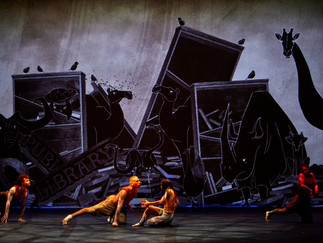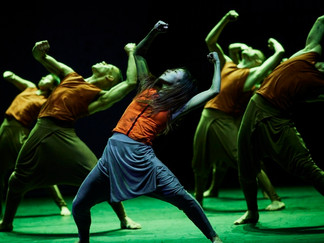Jungle Book reimagined
- Robert Beale

- May 15, 2023
- 3 min read
Akram Khan, Sharon Clark, Tariq Jordan and Jocelyn Pook, after Kipling and Disney
Akram Khan Company
The Lowry, Salford
May 13, 2023; 2 hrs 5 mins
(Further performances in Europe and beyond)


Everyone wants to polish their green credentials these days, and Akram Khan’s version of The Jungle Book is very clearly going down that road.
It’s on a world tour that has been running since last year, will continue through most of this one, and came to The Lowry on Saturday.
Most of us know one or more of the Disney versions better than we know the Kipling stories that inspired them, and dramaturgist Sharon Clark and writer Tariq Jordan put yet another new twist into their scenario, while clearly referencing that of the Disney films.
That Mowgli is now a girl isn’t really the biggest surprise: it’s the idea that her adoption by wild animal characters is the result of a global climate catastrophe in which sea levels rise until human civilisation as we know it is shattered; though, in line with the mantra we hear apparently broadcast early on and which is repeated later, they, along with the animals, are equally victims as “The waters are rising: [and] seek higher ground”.
Akela is a dog, but still leader of the wolves along with the other animals; Bagheera is a formerly captive albino panther and Baloo a former dancing bear (and comedian, just like the Baloo who sang The Bare Necessities), while the Bandar-log are former laboratory monkeys that have been brainwashed by humans and can still hear jingles and speeches they learned then. There’s a menacing outcast human called “The Hunter”, who is a threat to everything.
There are many other characters and incidents in the tale (though everyone wears similar costumes – no furry lookalikes here), and it’s told by a dazzling display of technical wonders, with a thin gauze at the front of the stage on which outline-drawing animations are projected, including representations of the birds and the elephants (which have a higher wisdom than all the other animals), and a screen at the back also showing them and much more besides – while the events are revealed mainly through play-style dialogue in which the animals, thoroughly anthropomorphised, speak. Kaa the snake, oddly, is represented by people holding cardboard boxes in a line (mostly).
And then there’s the music, composed by Jocelyn Pook, a creation in its own right. So it’s a kind of multi-genre “combined art-work” of the kind Richard Wagner might have admired.
When the dancing comes into it – because it does from time to time, as well as when we see the 10 dancers brilliantly imitating the gaits of wolf, ape, panther, bear, monkey and others, and miming the dialogue – there are ensemble set-pieces, mostly to extended essays in semi-minimalist but beguiling sound creations by Pook. These are rather like the arias in baroque opera, where the action stops and the music and movement are devoted to expressing a single emotion or mood: beautifully done and imaginatively choreographed, as perhaps only Akram Khan could conceive.
Immense technical resources have gone into the creation of this show (goodness knows what its carbon footprint will be by the time it’s been round the world), and it’s a sensory sauna. But does it really tell us anything, beyond the fact that we must respect creation and do all we can to stop climate change? I’m not sure.
More info here










